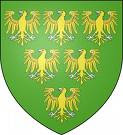BBC History also provides 'specials' - and the latest is on Medieval Kings and Queens. I was delighted to find an article by Kathryn Warner, (Website Edward II )featured inside with an excellent article on Isabella, wife and Queen of Edward II. Those who have read Kathryn's book, 'Isabella, Rebel Queen', will know how meticulous Kathryn's research is, and how hard she has worked to show that Edward and Isabella had a reasonably happy marriage, with Isabella tolerating Edward's favourites, such as Piers Gaveston and Roger Damory, before falling foul of Hugh Despencer. So many myths were debunked. So it was a real shame to see another new history magazine, 'The History of the Royals', feature an article on Isabella cast in her role as the she-wolf. And of course, with that, the old myths are repeated - namely that -
- Edward gave his wedding presents to Piers Gaveston, thus humiliating Isabella.
- Isabella 'endured' years of humiliation by her husband and Piers.
- Edward gave Piers Isabella's lands!
- Despencer/Edward deprived Isabella of her 4 children.(I know Kathryn is particularly dismayed about this myth).
- Isabella and Roger Mortimer were lovers - no doubt about it.
- They met in the Tower of London earlier, and Mortimer escaped.
- Edward blamed Mortimer for putting his marriage in jeopardy!
Worst of all, the article is called 'The Royal Lovers' Conquest'. Throughout the article, Isabella and Roger Mortimer are presented as lovers. Their behaviour scandalises the French and English courts. The article does not make it clear that this is one interpretation of their relationship, with little supporting evidence, and of course, Mortimer's wife and children fade into the background. The best thing that can be said about this article? At the end, for further reading, is recommended Kathryn's book. What a shame the author of this article didn't read it first.


